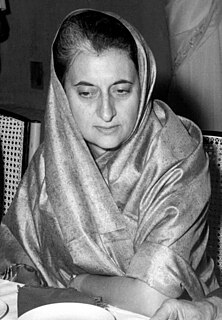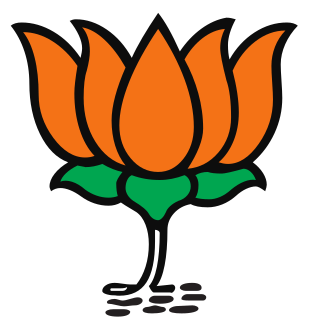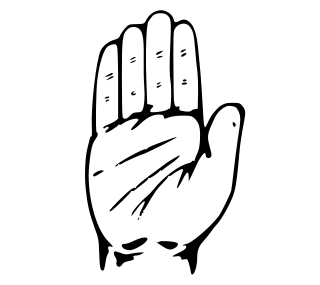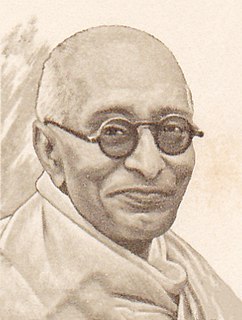Related Research Articles

India, officially the Republic of India, is a country in South Asia. It is the second-most populous country, the seventh-largest country by land area, and the most populous democracy in the world. Bounded by the Indian Ocean on the south, the Arabian Sea on the southwest, and the Bay of Bengal on the southeast, it shares land borders with Pakistan to the west; China, Nepal, and Bhutan to the north; and Bangladesh and Myanmar to the east. In the Indian Ocean, India is in the vicinity of Sri Lanka and the Maldives; its Andaman and Nicobar Islands share a maritime border with Thailand, Myanmar and Indonesia.

Indira Priyadarshini Gandhi was an Indian politician and a central figure of the Indian National Congress. She was the first and, to date, only female Prime Minister of India. Indira Gandhi was the daughter of Jawaharlal Nehru, the first prime minister of India. She served as prime minister from January 1966 to March 1977 and again from January 1980 until her assassination in October 1984, making her the second longest-serving Indian prime minister after her father.

Jawaharlal Nehru was an Indian independence activist and, subsequently, the first Prime Minister of India, as well as a central figure in Indian politics both before and after independence. He emerged as an eminent leader of the Indian independence movement, serving India as Prime Minister from its establishment in 1947 as an independent nation, until his death in 1964. He was also known as Pandit Nehru due to his roots with the Kashmiri Pandit community, while Indian children knew him better as Chacha Nehru.

Rajiv Ratna Gandhi was an Indian politician who served as the 6th Prime Minister of India from 1984 to 1989. He took office after the 1984 assassination of his mother, Prime Minister Indira Gandhi, to become the youngest Indian Prime Minister at the age of 40.

Rashtriya Swayamsevak Sangh, abbreviated as RSS, is an Indian right-wing, Hindu nationalist, paramilitary volunteer organisation. The RSS is the progenitor and leader of a large body of organisations called the Sangh Parivar, which have presence in all facets of the Indian society. RSS was founded on 27 September 1925. As of 2014, it has a membership of 5–6 million.

The Bharatiya Janata Party is one of two major political parties in India, along with the Indian National Congress. It is the current ruling political party of the Republic of India, having been so since 2014. The BJP is a right-wing party, and its policy has historically reflected Hindu nationalist positions. It has close ideological and organisational links to the much older Rashtriya Swayamsevak Sangh (RSS). As of 2019, it is the country's largest political party in terms of representation in the national parliament and state assemblies and is by far the world's largest party in terms of primary membership, with the second largest party, the Chinese Communist Party, having about half the registered members of the BJP.

The Indian National Congress, is a political party in India with widespread roots. Founded in 1885, it was the first modern nationalist movement to emerge in the British Empire in Asia and Africa. From the late 19th century, and especially after 1920, under the leadership of Mahatma Gandhi, Congress became the principal leader of the Indian independence movement. Congress led India to independence from the United Kingdom, and powerfully influenced other anti-colonial nationalist movements in the British Empire.

Chakravarti Rajagopalachari, informally called Rajaji or C.R., was an Indian statesman, writer, lawyer, and independence activist. Rajagopalachari was the last Governor-General of India, as India soon became a Republic in 1950. He was also the first Indian-born governor-general, as all previous holders of the post were British nationals. He also served as leader of the Indian National Congress, Premier of the Madras Presidency, Governor of West Bengal, Minister for Home Affairs of the Indian Union and Chief Minister of Madras state. Rajagopalachari founded the Swatantra Party and was one of the first recipients of India's highest civilian award, the Bharat Ratna. He vehemently opposed the use of nuclear weapons and was a proponent of world peace and disarmament. During his lifetime, he also acquired the nickname 'Mango of Salem'.

The Communist Party of India (Marxist) is a communist political party in India. It is one of the national parties of India. The party emerged from a split from the Communist Party of India in 1964. The CPI(M) was formed in Calcutta from 31 October to 7 November 1964.

The Communist Party of India is the oldest communist political party in India, and one of the eight national parties in the country. The CPI was formed on 26 December 1925 at Kanpur.

The Bahujan Samaj Party (BSP) is a national level political party in India that was formed to represent Bahujans, referring to Scheduled Castes, Scheduled Tribes, and Other Backward Classes (OBC), along with religious minorities. According to Kanshi Ram, when he founded the party in 1984, the Bahujans comprised 85 percent of India's population, but were divided into 6,000 different castes. The party claims to be inspired by the philosophy of Gautama Buddha, B. R. Ambedkar, Mahatma Jyotiba Phule, Narayana Guru, Periyar E. V. Ramasamy and Chhatrapati Shahuji Maharaj. Kanshi Ram named his protégée, Mayawati, as his successor in 2001. The BSP has its main base in the Indian state of Uttar Pradesh where it was the second-largest party in the 2019 Indian general election with 19.3% of votes and in the 2017 Uttar Pradesh elections with over 22% of votes. Its election symbol is an elephant.

The All India Forward Bloc (AIFB) is a left-wing nationalist political party in India. It emerged as a faction within the Indian National Congress in 1939, led by Subhas Chandra Bose. The party re-established as an independent political party after the independence of India. It has its main stronghold in West Bengal. The party's current Secretary-General is Debabrata Biswas. Veteran Indian politicians Sarat Chandra Bose and Chitta Basu had been the stalwarts of the party in independent India.

Dravida Munnetra Kazhagam (DMK) is a political party in India, particularly in the state of Tamil Nadu and union territory of Puducherry. It is currently the Opposition party in Tamil Nadu and is part of the Indian political front the United Progressive Alliance (UPA). DMK is a Dravidian party, adhering to the social democratic and social justice principles of C. N. Annadurai and Periyar E. V. Ramasamy. It was founded in 1949 by Annadurai as a breakaway faction from the Dravidar Kazhagam headed by Periyar E. V. Ramasamy.

Janata Dal was an Indian political party which was formed through the merger of Janata Party factions, the Lok Dal, Indian National Congress (Jagjivan), and the Jan Morcha united on 11 October 1988 on the birth anniversary of Jayaprakash Narayan under the leadership of V. P. Singh.

The All-India Muslim League was a political party established in 1906 in British India. Its strong advocacy for the establishment of a separate Muslim-majority nation-state, Pakistan, successfully led to the partition of India in 1947 by the British Empire.

The Republican Party of India is a political party in India. It has its roots in the Scheduled Castes Federation led by B. R. Ambedkar. The 'Training School for Entrance to Politics' was established by Ambedkar in 1956 which was to serve as an entry point to the Republican Party of India (RPI). The first batch of the school consisted of 15 students. Its first batch turned out to be last batch as the school was closed after Ambedkar's death in 1956.
Socialism in India is a political movement founded early in the 20th century, as a part of the broader movement to gain Indian independence from colonial rule. The movement grew quickly in popularity as it espoused the causes of India's farmers and labourers against the zamindars, princely class and landed gentry. Socialism shaped the principal economic and social policies of the Indian government but mostly followed Dirigism after independence until the early 1990s, when India moved towards a more market-based economy. However, it remains a potent influence on Indian politics, with many national and regional political parties espousing democratic socialism.
References
- ↑ Datta-Ray, B.; Agrawal, S. P. (1996). Reorganization of North-East India Since 1947. Concept Publishing Company. p. 63. ISBN 9788170225775.